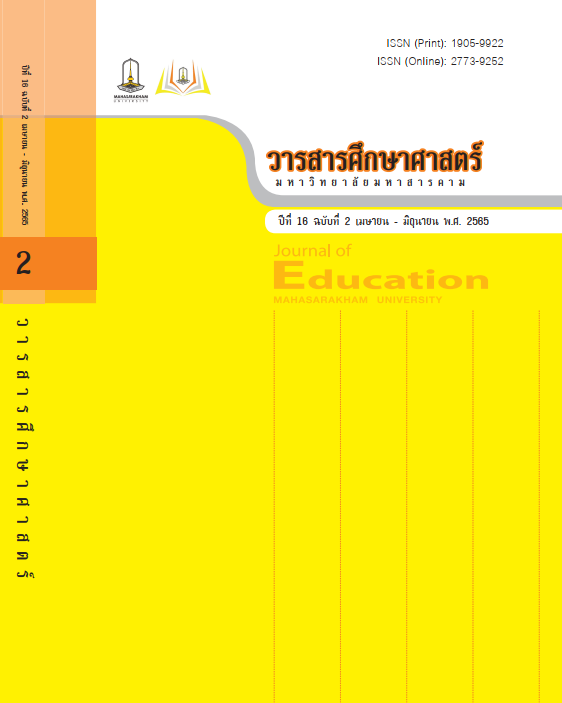Development of a Participatory Learning Activity in Conjunction with the Application Programming in a Project (Technology) for Secondary 3
Main Article Content
Abstract
The objectives of this research were 1) to determine the effectiveness of the development of participatory learning activities in combination with the application writing practice set to achieve the criteria 70/70. 2) To compare the learning achievement. Project (Technology) course, Secondary 3, to have a passing score of 70 per cent of the total score. And 3) to compare the programming ability. The 3rd-grade students who study with participatory learning activities and Programming projects in practice set (technology) will have a passing score of 70 per cent of the total scores. The sample groups consisted of 21 students in Secondary 3, semester 2, Academic Year 2020. Mahasarakham University Demonstration School (Secondary Semester) total of 21 students by purposive sampling. The instruments used in the study included 1) a participatory learning management plan. Science and technology group subject: system analysis and design 2) programming practice set 3) academic achievement test 4) programming ability assessment form the statistics used in the research were percentage, mean, standard deviation and one-sample t-test.The results were that:1. The effectiveness of the developments of participatory learning activities in a programming practice project (Technology). Effectively coursework at the 86.19/72.54.2. Students who study through participatory learning activities with a programming practice Project (Technology) course has an achievement score of 70 per cent of the total score specified. Level of significance at the 0.05 level.3. Students who study through participatory learning activities with a Programming practice project (Technology) course has a passing score of 70 per cent of the required score for the ability to programming. Level of significance at the 0.05 level.
Downloads
Article Details

This work is licensed under a Creative Commons Attribution-NonCommercial-NoDerivatives 4.0 International License.
References
กรมสุขภาพจิต. (2543). อีคิว: ความฉลาดทางอารมณ์. กรุงเทพฯ: สําานักพัฒนาสุขภาพจิต. กรมสุขภาพจิต.กระทรวงศึกษาธิการ. (2551). หลักสูตรแกนกลางการศึกษาขั้นพื้นฐานพุทธศักราช 2551.กรุงเทพมหานคร: กระทรงศึกษาธิการ.
ทิศนา แขมมณี. (2552). ศาสตร์การสอน. (พิมพ์ครั้งที่ 5). กรุงเทพฯ: ด่านสุทธาการพิมพ์จําากัด.
ทิศนา แขมมณี. (2554). ศาสตร์การสอน: องค์ความรู้เพื่อกระบวนการจัดการเรียนรู้อย่างมีประสิทธิภาพ. กรุงเทพฯ: สําานักพิมพ์แห่งจุฬาลงกรณ์มหาวิทยาลัย.
นิรันดร์ นวลอินทร์. (2548). การพัฒนาแผนการเรียนรู้ โดยใช้ชุดฝึกทักษะ เรื่องภาษาปาสคาลเบื้องต้น วิชาหลักการเกขียนโปรแกรม ระดับชั้นประกาศนียบัตรวิชาชีพ ชั้นปีที่ 2. วิทยานิพนธ์ปริญญามหาบัณฑิต กศ.ม., มหาวิทยาลัยมหาสารคาม, มหาสารคาม.
ประโยชน์ คุปต์กาญจนากุล. (2525). แบบการเรียนของนิสิตจุฬาลงกรณ์มหาวิทยาลัย. วิทยานิพนธ์ปริญญาครุศาสตรมหาบัณฑิต, จุฬาลงกรณ์มหาวิทยาลัย, กรุงเทพมหานคร.
ประวิทย์ อ้อยเธียรชัย. (2544). การศึกษาผลสัมฤทธิ์ทางการเรียนและเจตคติต่อวิชาวิทยาศาสตร์ ของนักเรียนชั้นมัธยมศึกษาปีที่ 1 ที่สอนโดยวิธีสอนแบบมีส่วนร่วมกับวิธสอนตามปกติ. วิทยานิพนธ์ปริญญาศึกษาศาสตรมหาบัณฑิต, มหาวิทยาลัยศิลปากร, กรุงเทพมหานคร.
พนภาค ผิวเกลี้ยงและมาเรียม นิลพันธุ์. (2557). การพัฒนาชุดฝึกทักษะการเขียนโปรแกรมสําาหรับนักเรียนชั้นมัธยมศึกษาปีที่ 5. วารสารศิลปากรศึกษาศาตร์วิจัย, 6(1), 80-90.
พรชัย เชี่ยวปัญญาทอง. (2555). ผลของการใช้เกมคณิตศาสตร์ตามแนวคิดการเรียนรู้แบบมีส่วนร่วมเพื่อส่งเสริมความสามารถในการคิดวิเคราะห์ของนักศึกษาผู้ใหญ่. วิทยานิพนธ์ปริญญาครุศาสตรมหาบัณฑิต, จุฬาลงกรณ์มหาวิทยาลัย, กรุงเทพมหานคร.
สกลพร พิชัยกมล. (2008). ผลการเรียนรู้แบบมีส่วนร่วมต่อความรู้เรื่องเพศศึกษาและทักษะชีวิตของนักเรียนชั้นมัธยมศึกษาปีที่ 3 โรงเรียนนนทรีวิทยา. วิทยานิพนธ์ครุศาสตรมกาบัณฑิต, มหาวิทยาลัยราชภัฏจันทรเกษม, กรุงเทพมหานคร.
สุภณิตา ปุสุริทร์คําา. (2544). คู่มือฝึกอบรมแบบมีส่วนร่วม. (พิมพ์ครั้งที่ 4). กรุงเทพฯ: วงศ์กมล โปรดักชั่น จําากัด.
อานนท์ พึ่งสายและต่อศักดิ์ แก้วจรัสวิไล. (2557). ผลของการจัดการเรียนรู้แบบมีส่วนร่วมที่มีต่อเจตคติในการเรียนพลศึกษาของนักเรียนชั้นมัธยมศึกษาปีที่ 5. วารสารศิลปากรศึกษาศาสตร์วิจัย, 6(1), 223-245.
Islam, M.R., and Mazumder, T.A. (2010). Mobile application and Its global Impact. International Journal of Engineering & Technology IJET-IJENS, 10(06), 72-78.
Kolb, D.A. (1984). Experiential Learning. Englewood Cliff, NJ: Prentice Hall.
Kolb, D.A., Rubin, I.M., & Osland, J. (1991). Organizational behavior: An experiential approach. Englewood Cliffs: Prentice-Hall.


